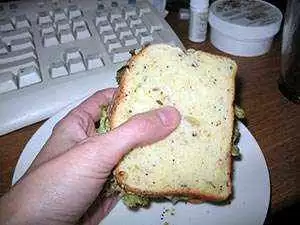Celiac.com 11/25/2011 - In solidarity with family members who have food allergies, many families enforce a voluntary ban on the food or foods in question. But is that an that a safe and advisable practice?
A leading dietitian claims that people who avoid foods to which they are not allergic may have problems if they attempt to reintroduce those foods later on in life. Dietitian Arlene Normand says that banning food for those without allergies is not healthy, and could lead to later health complications. Normand specifically claims that that banning foods for the whole family, just because a family member has allergies to those foods, may leave one at risk for developing sensitivities when those foods are reintroduced later.
Celiac.com Sponsor (A12):
 "You should not avoid any food because you can sensitize the body to that food," she said. "This could lead to an intolerance when you reintroduce the food. She cites wheat as another example, saying that people who "take wheat and gluten out of their diet suffer from bloating when they reintroduce bread." However, a number of prominent voice in the medical community strongly disagree with Normand.
"You should not avoid any food because you can sensitize the body to that food," she said. "This could lead to an intolerance when you reintroduce the food. She cites wheat as another example, saying that people who "take wheat and gluten out of their diet suffer from bloating when they reintroduce bread." However, a number of prominent voice in the medical community strongly disagree with Normand.
Many allergy specialists say there is no evidence to support that claim. Royal Prince Alfred Hospital allergy specialist Dr Robert Loblay flatly disputed Normand's claim. "There is no evidence to suggest that avoiding a food can predispose an individual to an intolerance," he Loblay. While he supported high risk allergy families eliminating foods such as gluten, milk or nuts, he said it can be difficult to enforce a total ban.
For example, Dr Loblay says that it's fine to ban gluten for convenience when someone in the family has celiac disease. However, he says, there's no sound evidence that other people in the family should avoid eating foods containing gluten, or that they will suffer once they reintroduce it into their own diets. Alyson Kakakios of The Children's Hospital Westmead agrees that it's fine for families to place blanket bans on foods for the sake of one family member.
"If one child has a cow's milk allergy, parents are in a bit of a dilemma about whether they should have cheese, yoghurt and cow's milk in the house because the risk is that the child will mistakenly drink or eat some," she said. "But that risk has to be counterbalanced against removing or excluding whole food groups from the other children and family members who are not allergic." So, what's the verdict on blanket bans of allergens for the whole family?
Of course, everyone should weigh their own personal factors into the mix, but the current scientific thinking says that such bans are optional, and that there will likely be no increased risk of allergy if or when a banned food is reintroduced to someone who is merely avoiding the food, but not allergic to it to begin with.
One exception on overall bans might be in those cases where allergies can be life-threatening. Exposure to certain allergens, such as nuts, can have severe consequences for people who are allergic, and an outright family ban might be easy and provide a great amount of relief all around. Anaphylaxis Australia president Maria Said agrees, saying "I would encourage parents to remove the allergen from the house if it is something that can be easily removed. It's much less stressful if you don't have the fear of your child having an anaphylactic fit."
Otherwise, don't worry. Ban or don't ban depending on your family needs. Just make sure you're replacing any nutrients you might be losing out on by avoiding the banned foods. There is currently no solid scientific evidence to suggest that people who avoid foods would have any problems if they ate those foods many years later.
Source:
- Open Original Shared Link







Recommended Comments